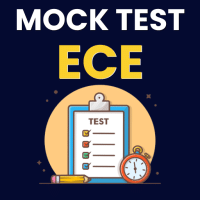Electronics and Communication Engineering (ECE) Exam > Electronics and Communication Engineering (ECE) Questions > Show that the sum of two random variables are...
Start Learning for Free
Show that the sum of two random variables are equal to their convolution?
Most Upvoted Answer
Show that the sum of two random variables are equal to their convoluti...
Understanding the Sum of Random Variables
When dealing with random variables, it's essential to understand how their sum behaves, especially in relation to convolution.
Definition of Random Variables
- A random variable is a numerical outcome of a random phenomenon.
- If X and Y are two independent random variables, their sum Z = X + Y is also a random variable.
Convolution of Random Variables
- The convolution of two probability density functions (PDFs) describes the distribution of the sum of two independent random variables.
- If f_X(x) and f_Y(y) are the PDFs of X and Y, respectively, the convolution is defined as:
f_Z(z) = ∫ f_X(x) * f_Y(z - x) dx
Sum of Random Variables Equals Convolution
- The distribution of the sum Z = X + Y is obtained by integrating the product of the individual PDFs.
- This integration accounts for all possible pairs of values (x, y) that sum to z, hence giving the probability distribution of Z.
Key Points to Remember
- The convolution captures how the probabilities of X and Y combine to produce the distribution of their sum.
- The result of the convolution provides the PDF of the random variable Z = X + Y.
Conclusion
In summary, the sum of two independent random variables is represented by their convolution. The mathematical operation of convolution effectively combines their individual distributions into the distribution of their sum, illustrating the fundamental relationship between random variables and their probabilities.
When dealing with random variables, it's essential to understand how their sum behaves, especially in relation to convolution.
Definition of Random Variables
- A random variable is a numerical outcome of a random phenomenon.
- If X and Y are two independent random variables, their sum Z = X + Y is also a random variable.
Convolution of Random Variables
- The convolution of two probability density functions (PDFs) describes the distribution of the sum of two independent random variables.
- If f_X(x) and f_Y(y) are the PDFs of X and Y, respectively, the convolution is defined as:
f_Z(z) = ∫ f_X(x) * f_Y(z - x) dx
Sum of Random Variables Equals Convolution
- The distribution of the sum Z = X + Y is obtained by integrating the product of the individual PDFs.
- This integration accounts for all possible pairs of values (x, y) that sum to z, hence giving the probability distribution of Z.
Key Points to Remember
- The convolution captures how the probabilities of X and Y combine to produce the distribution of their sum.
- The result of the convolution provides the PDF of the random variable Z = X + Y.
Conclusion
In summary, the sum of two independent random variables is represented by their convolution. The mathematical operation of convolution effectively combines their individual distributions into the distribution of their sum, illustrating the fundamental relationship between random variables and their probabilities.

|
Explore Courses for Electronics and Communication Engineering (ECE) exam
|

|
Show that the sum of two random variables are equal to their convolution?
Question Description
Show that the sum of two random variables are equal to their convolution? for Electronics and Communication Engineering (ECE) 2025 is part of Electronics and Communication Engineering (ECE) preparation. The Question and answers have been prepared according to the Electronics and Communication Engineering (ECE) exam syllabus. Information about Show that the sum of two random variables are equal to their convolution? covers all topics & solutions for Electronics and Communication Engineering (ECE) 2025 Exam. Find important definitions, questions, meanings, examples, exercises and tests below for Show that the sum of two random variables are equal to their convolution?.
Show that the sum of two random variables are equal to their convolution? for Electronics and Communication Engineering (ECE) 2025 is part of Electronics and Communication Engineering (ECE) preparation. The Question and answers have been prepared according to the Electronics and Communication Engineering (ECE) exam syllabus. Information about Show that the sum of two random variables are equal to their convolution? covers all topics & solutions for Electronics and Communication Engineering (ECE) 2025 Exam. Find important definitions, questions, meanings, examples, exercises and tests below for Show that the sum of two random variables are equal to their convolution?.
Solutions for Show that the sum of two random variables are equal to their convolution? in English & in Hindi are available as part of our courses for Electronics and Communication Engineering (ECE).
Download more important topics, notes, lectures and mock test series for Electronics and Communication Engineering (ECE) Exam by signing up for free.
Here you can find the meaning of Show that the sum of two random variables are equal to their convolution? defined & explained in the simplest way possible. Besides giving the explanation of
Show that the sum of two random variables are equal to their convolution?, a detailed solution for Show that the sum of two random variables are equal to their convolution? has been provided alongside types of Show that the sum of two random variables are equal to their convolution? theory, EduRev gives you an
ample number of questions to practice Show that the sum of two random variables are equal to their convolution? tests, examples and also practice Electronics and Communication Engineering (ECE) tests.

|
Explore Courses for Electronics and Communication Engineering (ECE) exam
|

|
Signup for Free!
Signup to see your scores go up within 7 days! Learn & Practice with 1000+ FREE Notes, Videos & Tests.






















